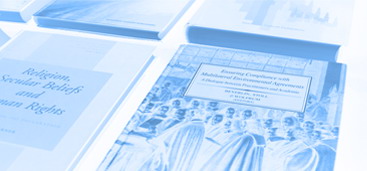Recent Case law of the European Court of Human
Rights: an everview
Reporter: Valery A. Musin,Rights: an everview
Professor of Law, Head of the Civil Procedure Department of the St. Petersburg State University Faculty of Law.
Currently the Russian Federation is chairing the Committee of Ministers of the Council of Europe. Our motto is: “Towards united Europe without dividing lines”. In order to make European counties closer to each other it is very important to ensure unified application of norms as contained in international treaties with participation of those countries, first of all – in the Convention on Protection of Human Rights and Fundamental Freedoms.
This Convention provides a legal mechanism for procuring unified interpretation of the Convention’s rules – i.e. the European Court of human rights whose case law is binding for the Member Countries and their national authorities including courts. That is why learning of the European Court’s precedents is vitally important.
The European Court gives in its judgements legal assessment of acute problems existing in modern world under the angle of maintenance of a fair balance between private and public interests.
A very significant example illustrating such an approach is a case of Refah Partisi (the welfare Party) and others v. Turkey (Judgement of 13th February 2003). The Constitutional Court of Turkey dissolved the welfare Party whose aim was to introduce sharia law and theocratic regime in the country.
In course of consideration of the Party’s complaint on alleged violation of Article 11 (freedom of assembly and association) of the Convention by Turkish authorities the European Court, after analysis of Conventions norms on freedom of thoughts, conscience and religion, freedom of assembly and association and their correlation with democracy and state institutions which are designated to ensure it, came to a conclusion that one cannot declare his devotion to democracy and at the same time support a regime based upon sharia which clearly deviates from the rights fixed in the Convention, especially as concerns criminal law and criminal proceedure, legal status of women etc.
The Court unanimously decided that when dissolving the Party in question, Turkish authorities did not violate Article 11 of the Convention.
The European Court repeatedly emphasises that one of substantial conditions of effectiveness of court judgements is a reasonable time period of court proceedings. In order to clarify whether proceedings in a concrete case complied this requirement, the following aspects should be taken into consideration: complication of the case, actions of the claimant and relevant state authorities, and importance of the issue being considered in the case, for the claimant.
When addressing this problem in a concrete situation where a term between the date of filing a statement of claim and issuance of a final court judgement amounted to several years, the European Court noted that the hearing has been adjourned numerous times upon the motions of the claimant who repeatedly challenged the judges, changed his counsels, which circumstances resulted in delay with consideration of the case.
Given the abovementioned, the European Court held that the requirement of reasonable time of court proceedings has been complied in this case (see: Konstantin Antonov V. the Russian Federation, the Judgement of 3rd November 2005).
Case law of the European Court provides courts of Member Countries with guide lines how to resolve disputes concerning alleged violation of human rights and fundamental freedoms as provided by the Convention.

